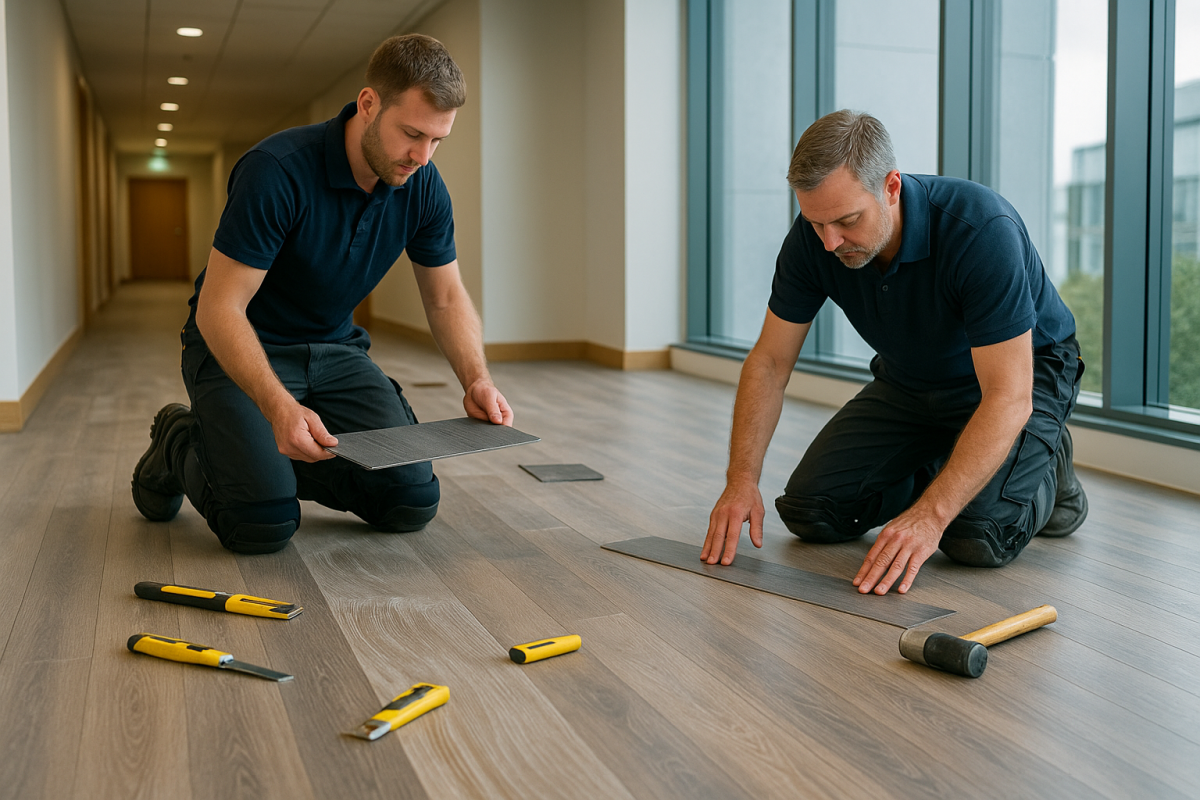Career Pathways in Contract Floor Installation
Starting your career in contract floor installation in Ireland is a practical and rewarding option for those interested in skilled trades. The pathway typically includes completing a flooring apprenticeship in Ireland, obtaining a recognised certification such as a Special Purpose Award in Contract Flooring, and gaining on-site experience through flooring installer jobs in Ireland.
With that in mind, let’s look at how you can begin a career in contract floor installation in Ireland.
Understanding the Contract Floor Installation Industry
The contract floor installation industry in Ireland plays a vital role in construction and interior finishing. It involves fitting, laying, and maintaining various types of flooring in residential, commercial, and industrial buildings. From hardwood and laminate to vinyl and carpet tiles, the demand for professional floor fitters continues to rise due to ongoing development and retrofitting projects across the country.
Flooring installer jobs in Ireland are considered essential within the construction industry flooring roles sector. Skilled floor fitters make a tangible impact on the safety, durability, and aesthetic appeal of spaces, all while ensuring compliance with building regulations. It’s a hands-on, in-demand trade with an abundance of opportunities in floor installation for those who pursue vocational routes for floor fitters.
Core Responsibilities of a Contract Floor Installer
The duties of a floor installer vary depending on project size and materials used, but common responsibilities in Ireland include:
1. Floor Preparation: Assessing and prepping subfloors, including levelling, sanding, or cleaning surfaces to guarantee solid installations.
2. Material Selection and Measurement: Reviewing floor plans, selecting appropriate flooring materials, and accurately measuring and cutting to fit complex layouts.
3. Installation: Fitting flooring types such as vinyl, laminate, carpet, tile, and timber using adhesives, manual tools, or modern equipment in line with manufacturer and safety guidelines.
4. Finishing: Installing trims, skirting boards, or thresholds, and ensuring seam alignment and pattern consistency where required.
5. Maintenance and Repairs: Performing remedial work or floor replacements when damage occurs or as buildings are refurbished.
6. Health and Safety Compliance: Adhering to safety protocols, including correct PPE usage and ensuring workspaces are hazard-free, particularly important in commercial jobsites.
Essential Soft Skills
Alongside the practical abilities, successful flooring professionals share several soft skills that make them reliable and efficient:
Attention to Detail: Proper alignment, symmetry and polished finishes rely on precision and focus.
Physical Stamina: The nature of flooring work requires consistent physical effort—bending, kneeling, lifting and long hours on site.
Problem-Solving Abilities: Each project can present unexpected challenges; being able to creatively and quickly find solutions is key.
Customer Service: Particularly for residential or retail contracts, being courteous and responsive to client expectations goes a long way.
Teamwork and Communication: Floor installers often work as part of broader construction teams, so coordination and clear communication are essential.
Steps to Becoming a Contract Floor Installer in Ireland
Step 1: Complete Junior Certificate or Leaving Certificate (recommended).
While not a strict requirement, completing secondary school gives you a solid educational foundation and prepares you for apprenticeship entry requirements.
Step 2: Enter a flooring apprenticeship in Ireland.
Apply for a structured flooring apprenticeship, often delivered via SOLAS. Apprenticeships combine classroom-based learning with hands-on training under a qualified employer.
Step 3: Gain on-site experience.
Working alongside experienced professionals, you’ll learn to use tools, understand flooring types and techniques, and build your confidence in live projects.
Step 4: Earn a Special Purpose Award in Contract Flooring.
This QQI-accredited certification validates your technical skills and professional competence in contract floor installation. It’s recognised across the Irish construction sector.
Step 5: Continue professional development.
After initial qualification, you may decide to specialise in certain materials or settings (e.g., hospital flooring, safety surfacing), or upskill to supervisory or training roles.
Salaries and Career Growth
The earnings for flooring installer jobs in Ireland can vary depending on level of experience, employer, and region. Below is a general guide:
Entry-Level: €28,000 – €32,000 per year. Apprentices may earn less but increase earnings as they progress.
Mid-Level: €33,000 – €45,000 per year. With a few years of experience, floor fitters can confidently manage complex installations and start to specialise.
Senior-Level: €46,000 – €60,000+ per year. Samplings of Irish companies suggest those in supervisory, contract management or training roles earn significantly more.
There’s consistent demand for those on the floor fitting career path. Many installers go on to start their own flooring businesses or move into site management within broader construction industry flooring roles. The industry has a strong demand for reliable, skilled tradespeople—especially those with recognised certifications.
Courses and Certifications
To succeed in the skilled trade flooring jobs sector, accredited training is essential. You’ll want a combination of practical instruction and theory supported through Irish-recognised organisations. Some key qualifications include:
- Special Purpose Award in Contract Flooring (QQI Level)
- Craft Certificate via a SOLAS-approved apprenticeship programme
- Health & Safety certifications relevant to on-site flooring work
These certifications prove your professionalism and competence and are essential to meet employer or project requirements.
If you would like to find out more about certification and the courses available to you, just get in touch or complete the form below.

